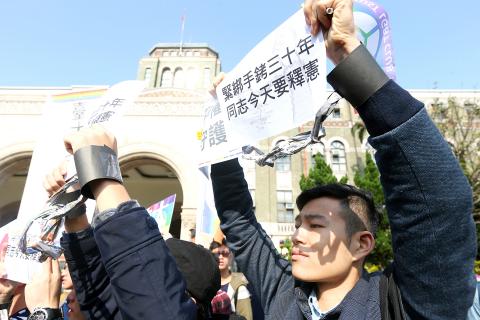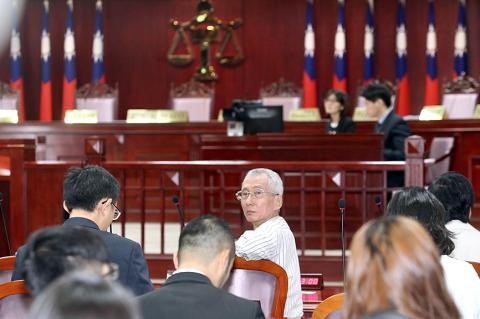The Council of Grand Justices yesterday began a session to hear a constitutional challenge concerning same-sex marriage, during which the spotlight fell mostly on Minister of Justice Chiu Tai-san (邱太三), who defended the legality of the Civil Code’s definition of marriage as being between a man and a woman.
In an unprecedented move, the debate was live-streamed. A ruling is expected within two months.
Taiwan is the first Asian nation to assent to a constitutional interpretation on the legalization of same-sex marriage.

Photo: CNA
The debate addressed two requests for an interpretation, filed by the Taipei City Government and gay rights advocate Chi Chia-wei (祁家威), who has over the past three decades sought legal recognition of his union with his partner.
The challenges mostly focus on marriage as defined in Chapter II of the Civil Code, which in Article 972, Section 1, stipulates that: “An agreement to marry shall be made by the male and the female parties in their own concord.”
Chi was the first to make his argument, followed by law professor Liao Yuan-hao (廖元豪), who represented the Taipei City Government, with both arguing that same-sex marriage is a right protected by the Constitution and that the Civil Code is unconstitutional because it does not protect homosexual unions.

Photo: CNA
The panel of 14 grand justices then heard opinions and reports from Chiu, followed by representatives of related government agencies, including the Ministry of the Interior’s Household Registration Department Director Wanda Chang (張琬宜).
After arguments were presented, a cross-examination session was held in which both sides were questioned by six court-appointed expert witnesses before the hearing ended at noon.
While a number of opinions were voiced during the hearing, Chiu’s remarks drew the most attention, particularly his insistence that a lawful marriage — based on its definition in the Civil Code and prior legal interpretations by the Ministry of Justice and the Council of Grand Justices — is limited to a union between a man and a woman.
“The Civil Code stipulates that marriage shall be between a man and a woman, and as such it is not unconstitutional. The Constitution guarantees citizens’ right to marry as that between a man and a woman, while marriage between people of the same sex is not covered under the Constitution,” Chiu said.
“For thousands of years in the nation’s history, society has instituted traditions and codes of conduct regarding marriage. Has there ever been a cultural institution or social phenomenon for same-sex marriage?” Chiu said.
“Without a doubt, there has been none,” Chiu said.
He then quoted one section of the Chinese classic I Ching (易經), also known as the Book of Changes, which reads: “With the existence of the earth and the sky, there came all living things. With the existence of the earth and the sky, there came men and women,” which he said illustrates that Chinese marriage traditions have — since ancient times — been based on a union between a man and a woman.
Chiu also suggested that same-sex marriage could destroy a number of traditional cultural and ritual observances, citing as an example the use of kao (考) and bi (妣) at funerals and memorial tablets for deceased fathers and mothers.

A magnitude 7.0 earthquake struck off Yilan at 11:05pm yesterday, the Central Weather Administration (CWA) said. The epicenter was located at sea, about 32.3km east of Yilan County Hall, at a depth of 72.8km, CWA data showed There were no immediate reports of damage. The intensity of the quake, which gauges the actual effect of a seismic event, measured 4 in Yilan County area on Taiwan’s seven-tier intensity scale, the data showed. It measured 4 in other parts of eastern, northern and central Taiwan as well as Tainan, and 3 in Kaohsiung and Pingtung County, and 2 in Lienchiang and Penghu counties and 1

FOREIGN INTERFERENCE: Beijing would likely intensify public opinion warfare in next year’s local elections to prevent Lai from getting re-elected, the ‘Yomiuri Shimbun’ said Internal documents from a Chinese artificial intelligence (AI) company indicated that China has been using the technology to intervene in foreign elections, including propaganda targeting Taiwan’s local elections next year and presidential elections in 2028, a Japanese newspaper reported yesterday. The Institute of National Security of Vanderbilt University obtained nearly 400 pages of documents from GoLaxy, a company with ties to the Chinese government, and found evidence that it had apparently deployed sophisticated, AI-driven propaganda campaigns in Hong Kong and Taiwan to shape public opinion, the Yomiuri Shimbun reported. GoLaxy provides insights, situation analysis and public opinion-shaping technology by conducting network surveillance

Taiwan is gearing up to celebrate the New Year at events across the country, headlined by the annual countdown and Taipei 101 fireworks display at midnight. Many of the events are to be livesteamed online. See below for lineups and links: Taipei Taipei’s New Year’s Party 2026 is to begin at 7pm and run until 1am, with the theme “Sailing to the Future.” South Korean girl group KARA is headlining the concert at Taipei City Hall Plaza, with additional performances by Amber An (安心亞), Nick Chou (周湯豪), hip-hop trio Nine One One (玖壹壹), Bii (畢書盡), girl group Genblue (幻藍小熊) and more. The festivities are to

Auckland rang in 2026 with a downtown fireworks display launched from New Zealand’s tallest structure, Sky Tower, making it the first major city to greet the new year at a celebration dampened by rain, while crowds in Taipei braved the elements to watch Taipei 101’s display. South Pacific countries are the first to bid farewell to 2025. Clocks struck midnight in Auckland, with a population of 1.7 million, 18 hours before the famous ball was to drop in New York’s Times Square. The five-minute display involved 3,500 fireworks launched from the 240m Sky Tower. Smaller community events were canceled across New Zealand’s